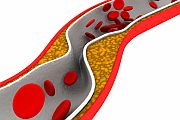
SATURDAY, March 14, 2015 (HealthDay News) — Long-term use of the newer anti-clotting drug Brilinta cut heart attack survivors’ future risk of heart attack, stroke or heart-related death, a new study found.
The study was funded by Brilinta’s maker, AstraZeneca, and was scheduled for presentation Saturday in San Diego at the annual meeting of the American College of Cardiology (ACC).
One expert not connected to the new study said the findings are encouraging, even though Brilinta typically costs more than older, generic blood thinners.
Long-term cost savings — due to Brilinta users avoiding more heart attacks or strokes — “might help offset the upfront cost of Brilinta compared to generic anti-clotting agents,” explained Dr. David Friedman, chief of heart failure services at North Shore-LIJ’s Franklin Hospital in Valley Stream, N.Y.
The new study was led by Dr. Marc Sabatine, a cardiologist at Brigham and Women’s Hospital and Harvard Medical School in Boston. His team tracked outcomes for more than 21,000 people across 31 countries. All of the study participants had survived a heart attack in the previous one to three years.
The patients also had other factors, such as diabetes or older age, that put them at risk for another heart attack and were taking aspirin as a preventive measure, the study authors said.
Patients randomly received a twice-daily dose of either 90 milligrams (mg) of Brilinta (ticagrelor), 60 mg of the drug, or an inactive placebo. All of them kept taking low-dose aspirin, a standard therapy.
Over an average follow-up of about three years, the risk of heart attack, stroke and heart-related death was 15 percent lower among those who took the 90-mg dose of Brilinta and 16 percent lower among those who took the 60-mg dose of the drug, compared with those who took the placebo, the team said.
The study was published online Saturday in the New England Journal of Medicine. Sabatine has received payments from AstraZeneca.
“The benefit we saw [from Brilinta] was remarkably consistent across the individual components of [heart health events] and in all the major subgroups of patients,” Sabatine said in an ACC news release.
About 7 percent of the study patients stopped taking Brilinta due to bleeding, and about 5 percent stopped taking it due to shortness of breath, the findings showed.
The twice-daily, 90-mg dose of Brilinta is already approved to treat acute coronary syndrome, a form of heart disease, the study authors said in the news release.
Dr. Kirk Garratt is director of interventional cardiovascular research at Lenox Hill Hospital in New York City. He explained that “after a heart attack, people are at high risk of another one. We know medicines like Brilinta and low-dose aspirin help lower the risk over a year or so, but this study confirms that continuing dual anti-clotting therapy for up to three years is helpful.”
And although “bleeding was higher with longer [Brilinta] treatment, it wasn’t seen at rates that would be especially worrisome,” Garratt added.
“It’s also nice to see that a somewhat lower dose of 60 mg produced as much benefit as the higher 90-mg dose,” Garratt said. “Even though bleeding rates weren’t very different between these doses, clinicians will be happy to have access to a lower dose.”
More information
The U.S. National Heart, Lung, and Blood Institute has more about life after a heart attack.
Copyright © 2026 HealthDay. All rights reserved.

